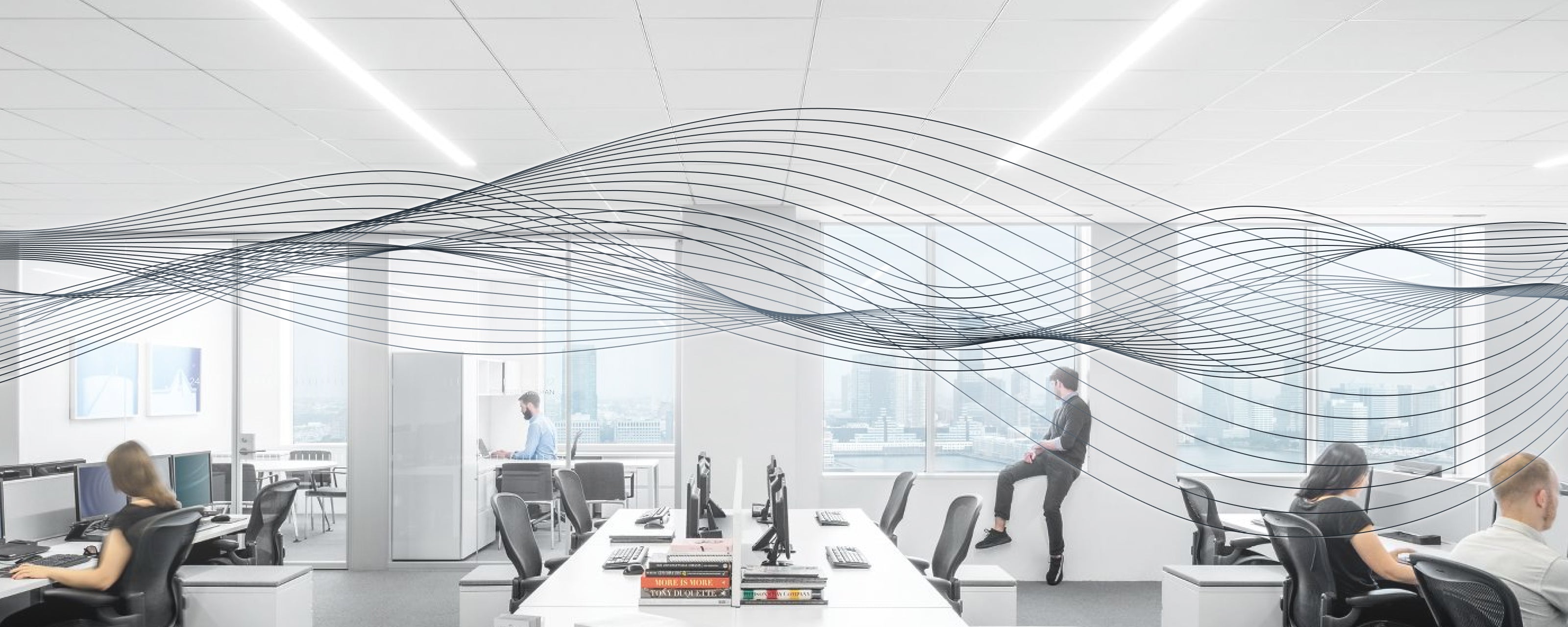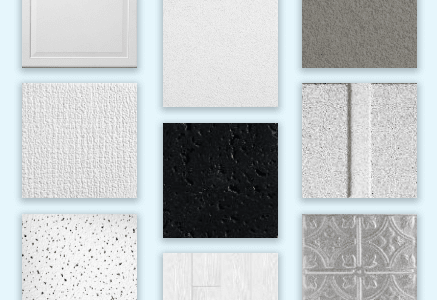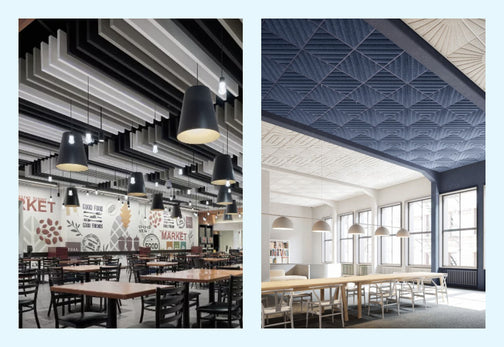How to choose the right acoustic ceiling tile for your space

What are acoustic ceiling panels?
Acoustic ceiling tiles are an easy and effective way to reduce the echo in a noisy room. Our acoustic ceiling tiles fall into three major categories. These ceiling tiles can be used to absorb sound, block sound, or both!
How are ceiling tile acoustics measured?
Ceiling tile acoustics are measured in two ways: Noise Reduction Coefficient and Ceiling Attenuation Class.
Noise Reduction Coefficient, or NRC, is the percent of sound that can be absorbed by a tile.The higher the percentage, the more sound absorbed. A ceiling tile with an NRC of .95 absorbs 95% of sound.
Ceiling Attenuation Class, or CAC measures the amount of decibels the tile can block from leaving or entering a closed room. The higher the CAC rating, the better the performance. A ceiling system with a CAC less than 25 is very low performance, whereas a ceiling with a CAC of 35 or greater is considered high performance.
Our acoustic ceiling tiles are classified at three different levels: Best, Better, Good.
Best
• NRC 0.80+ and CAC 35+
• Best used in high traffic spaces or multipurpose spaces where maximum sound absorption and sound blocking are needed to help keep noise levels down and prevent disruption to adjacent spaces.
Better
• NRC 0.70-0.75 and CAC 35+
• Best used in spaces where strong sound absorption and sound blocking are needed for all-around acoustical performance.
Good
• NRC 0.60-0.65 and CAC 35+
• Best in spaces where less sound absorption is required but sound blocking is needed to maintain privacy between adjacent areas.
Why are they important?
Every environment, whether residential or commercial, benefits from the comfort and functionality of acoustic panels. They reduce noise and improve the environment. Acoustical panels reduce the volume of the room's overall sound, filter outside noises, and cancel out any background noise that may be present.
Noise
• More noise is coming as a result of new layouts with dividers and flexible walls not built to roofs, as well as from more non-porous, cleanable surfaces. Finding ways to add noise control – both sound absorption and sound blocking – will be needed with these changes. Studies show that noise impedes effectiveness, healing, and learning and raises stress levels no matter what the setting.
Confidentiality
• Sound blocking is especially important for privacy when walls are not built to the roof, which means from floor to ceiling. High sound blocking ceiling performance, paired with good design, can result in confidential speech privacy, even without building walls to roof.
When do you know acoustical ceiling tiles are needed?
The needs of everyone are different, but some good general guidelines to follow to know if acoustic ceiling tiles are needed are:

Size and shape of the room
• Reverb and echo tend to be more pronounced in larger rooms. When sound reflects off a surface, it is either absorbed or reflects it onto another surface. The lengthier the distance that the sound must travel between each of these bounces, the longer the time it will take for the sound waves to stop.
• The shape of the room is another crucial aspect to take into account. Reverberation time is lengthened by high ceilings. Hard floors or parallel surfaces give the room a noticeable resonance. You can solve these issues by installing acoustic panels.

Surface materials in the room
• The type of materials used in the room should be taken into account. Do you have hardwood floors or carpeting on the floor? Do your walls consist of drywall or concrete? Soft and porous textures absorb more sound than hard surfaces do, shortening the reverberation period. Hard surfaces reflect more sound, which has a significant impact on the reverb time.
• The things that are in the room are also crucial. Having a completely furnished space with soft couches and pillows reduces the echo effects by absorbing sound into the materials. As a result, you might need less acoustic panels inside the space.

Purpose of the room
• There is no one size fits all when it comes to acceptable levels of room reverberation. How much and at what frequencies you want to absorb sound depends on the room's use. You can choose less acoustic panels if all that has to be absorbed are high and midrange frequencies. High and low frequencies are both absorbed by more acoustic panels. In general, low frequency absorption is not necessary if you wish to reduce background noise.
What are the best acoustic ceiling tiles?
1. CALLA
The Armstrong CALLA ceiling tile provides our smoothest finish mineral fiber ceiling available with excellent acoustic performance including noise reduction and sound blocking.
2. ULTIMA Lay-In and Tegular
A smooth visual ceiling with acoustic performance - sound absorption and blocking needed for today’s flexible spaces. ULTIMA Lay-in and Tegular allows the tile to protrude below the grid ceiling system and provide more depth and texture to the ceiling plane.
3. CIRRUS
The Armstrong CIRRUS ceiling tiles have a medium-texture and excellent acoustic sound absorption and blocking performance.
4. LYRA Plant Based High CAC
LYRA Plant Based High CAC are smooth, white, drywall-like ceiling tiles that have excellent noise reduction and even better sound blocking for open plan areas.
Lower the noise with Kanopi
By replacing older standard ceiling tiles you can improve the acoustics of any room. There are a large variety of acoustic ceiling tiles for every type of sound control. Depending on the nature of your project, you can choose between a variety of finishes, sizes, and textures. Shop our acoustic ceiling panels today or connect with an expert to see what works best for you.







 Thanks for subscribing!
Thanks for subscribing!